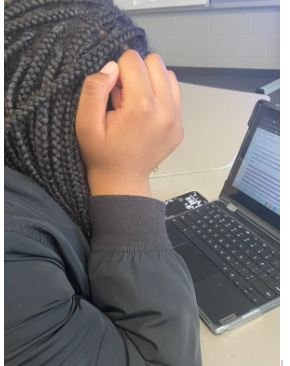Your teenager’s slump isn’t due to “tech neck” – it’s due to school stress. Ages 14-18 are the most pivotal moments in a young student’s life, but also, the most stressful. The idea of the overworked teen is still thriving and even more-so throughout the magnet programs.

Magnet schools are a luxury for most teenagers. They’re public schools with the advantage of furthering a student’s passions or academics. George Washington Carver Center for Arts & Tech is a lucky magnet school: giving students all across Baltimore County the opportunity to pursue their ambitions and chase a dream–but at what cost?
Mental health amongst teenagers is in shambles. Many schools and districts are implementing therapy programs and encouraging the aid of guidance counselors, but these higher bodies are not recognizing that mental health doesn’t start or end with outside-of-school problems: it travels into the building. Acting prime sophomore Niyah Green says the school is enforcing personal sacrifices to maintain a decent academic career. She spends about 4-5 hours on homework alone, “I haven’t been able to do my hobbies as much,” Green states. “I haven’t had much time to myself, you know, just like for reading or just personal enjoyment.”
Green goes to bed at 11:30 PM-12 AM at the earliest, and has to wake up to prepare for school at 4:30 AM. She’s averaging about 3-4 hours of sleep per night, and that’s affecting her mental and physical health. Green has time management strategies set in place but “[She’s] also in multiple advanced classes, so the workload is just…[she’s] managing [her] time just enough to get the work done.” It’s sacrifices unheard of to get work completed, but according to Green, the workload isn’t worth it.
An excessive workload is said by many teachers to prepare students for college, but the reality is that it’s unnecessary. It sets an expectation that college will be an overly aggressive environment–and while it has its highs and lows just like anything else–and instead of preparing students, it’s sucking them dry. High school students are being “worked to the bone”, best said by Literary Arts sophomore Morgan Timmons. She believes that the workloads are excuses for the schools, and like Green, she feels unfulfilled by the content and intensity of the school work. “We do more work at home than we do at school. It’s unfair how the teachers want us to do their jobs for them.” Timmons feels drained, getting a small amount of sleep and making up for that by napping through some of their classes. “I slept all through 1st period,” the sophomore states. It impacts her grade and through that, a vicious cycle is started. What support is the school giving?
School guidance counselors and programs like “Advisory” are set in place to aid students in all of their emotional, educational, and mental endeavors – but what is their answer when students say they’re stressed? According to Timmons, she feels as though her teachers and counselor(s) are not helping, nor are they safe spaces to just rant. She cannot reveal what may be on her mind in regards to school, so what is she to do? High school students are oftentimes equated to being “mature” and young adults when the reality is that high school students are still children. Children need time to learn, develop, build, grow—stressing them out is unfair and calls for change.
DP (design & production) student Riley Yates revealed that she is working up to 20 hour weeks for her prime—all unpaid. And while the program is administering payment for the extensive work the students do, it’s only minimum wage, and it’s highly unfair. “I have to stay ‘til 10PM tonight. Tomorrow, too,” Yates informs. She’s oftentimes heavily sleep-deprived, even sometimes behind on some work, but has no choice. Payment isn’t enough for the students, especially since it’s only for certain primes and only minimum wage, and this is only a phenomenon that would occur at a magnet school. To impose change on the stress that students feel, it’s necessary to take into consideration the rate at which students are sleeping in class, missing school, and not turning in assignments.
Niyah Green says it best, “I’m not learning; I’m certainly memorizing. I would say it’s worth it for the grades, not for the personal and social sacrifice.” She, among other students, agree that teachers and school districts need to tweak their curriculum’s and/or workload. It’s overbearing and inconsiderate, accounting for the fact that many Carver attendees are not native/relative to the Towson area, have extra-curricular activities, have difficult home-lives, or have other classes/commitments that need to be attended to. There’s a general understanding amongst the students that assignments will overlap and that sacrifices are necessary, but there should be an understanding within the body of the school that overloading does not equal teaching. Kids are being burnt out by the minute, and the only way to change that is to reform the basis of what constitutes as “necessary” and “teaching”. It’s a fault that starts in the school, and needs to end there.





